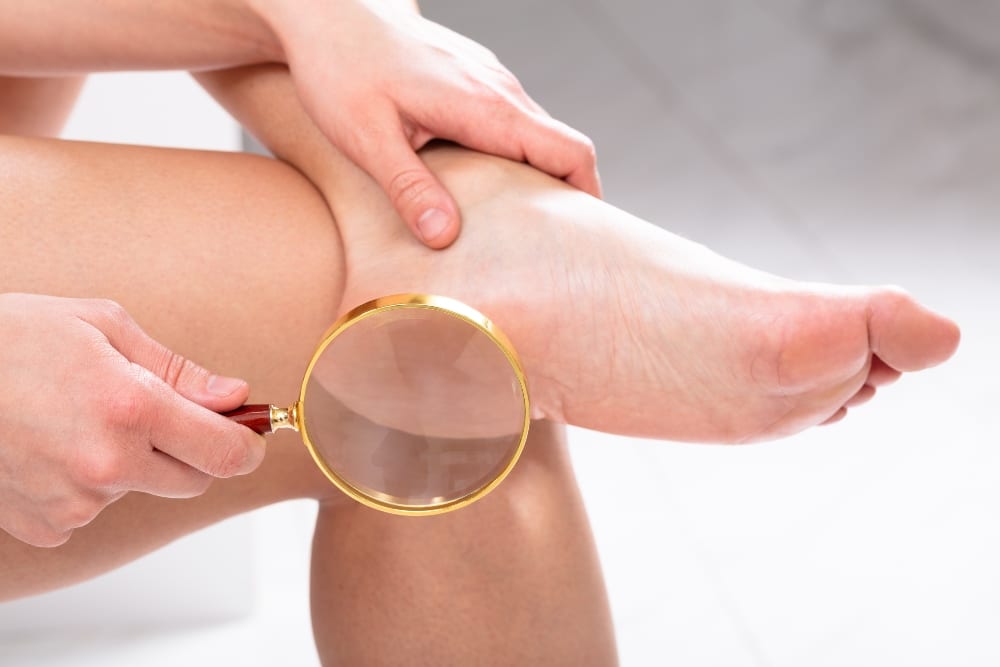Diabetic Wounds
Minor wounds, cuts, and burns are an inevitable part of life. However, if you have been diagnosed with diabetes, they can create detrimental problems for your overall health.
In fact, complications brought about by diabetic-related wounds are responsible for over 60% of all non-traumatic lower-limb amputations!
If you have diabetes, then you may already know that wounds can be slow to heal – or they might not even heal at all. This puts you at a higher risk for infection, which can spread to the surrounding areas and potentially cost you a limb if you don’t quickly and thoroughly address the problem.
Having diabetes means reduced blood flow to your feet which, in turn, makes it hard for your body to resist infections and heal any possible injuries. Diabetes can also cause nerve damage and take away feeling in your feet, also known as neuropathy.
And if you can’t feel your feet, how are you supposed to know that you are developing sores and wounds?
That is why it is so important to treat foot injuries right away, particularly if you have diabetes.
Therefore, the best thing to do is to prevent, prevent, prevent. And we are here to help you make sure your foot health is top priority on your to-do list – as it should be! From understanding diabetic wounds to learning how to prevent – and treat them – here at Kalamazoo Podiatry we’ve got your back!
Understanding Diabetic Wounds
Let’s dive a little deeper – after all, understanding diabetes and the complications that come along with this condition is a vital aspect of preventing diabetic wounds from developing and becoming infected.
First, to the obvious part – diabetes makes it difficult for your body to manage blood glucose levels. And if your blood glucose remains chronically high, then the function of white blood cells is essentially impaired. This means that your body is unable to fight off bacteria and consequential infections.
Next, you should know that diabetes is also closely associated with poor circulation. This aspect of diabetes makes it difficult for your body to deliver much-needed nutrients to sores and wounds, resulting in slow healing or even no healing at all.
The last thing you should understand is that nerve damage is yet another fairly common symptom of diabetes. Perhaps, this is the most scary part of diabetes – you may sustain trauma to your feet more easily without even being aware that they are injured. This can not only prevent you from seeking treatment, but also allow a wound to become even worse.
But there is still hope! If you always keep your feet’s health in mind, then your risk of wound development and infections can drastically decrease.
How Can You Prevent Diabetic Wounds?
You can prevent diabetic wounds from developing and becoming infected by managing your blood glucose, using proper foot care, treating wounds promptly, and having regular podiatric medical care.
However, there are plenty of other things you should as well. Check out the list below:
- Check your feet for any scrapes, cuts, sores or wounds at least once a day.
- Reduce friction and pressure on your feet by using appropriate footwear.
- Wash your feet daily and always pat them completely dry.
- Apply moisturizing lotion (but never between your toes).
- Avoid walking barefoot (even when you are at home).
- Be careful when trimming your toenails.
- Check your shoes before placing them on your feet.
- And – we thought we should reinforce – visit your podiatrist on a regular basis.
It is also worth mentioning that you should carefully monitor any existing wounds – though it is normal for diabetic wounds to heal slowly, it is not normal for them to remain open for several weeks, to spread or ooze, or to be extremely painful.
We Can Help You!
Whenever you notice a wound – regardless of it being infected or not – you should seek podiatric medical treatment immediately. The primary goal of treatment is to obtain healing as soon as possible – the faster the healing, the less chance for an infection.
We will begin your consultation by performing a thorough evaluation of your condition in order to determine the best type of treatment for your specific case. We may recommend one or more of the treatment methods below:
- Preventing infection.
- Off-loading, or taking the pressure off the area.
- Debridement, or removing dead skin and tissue.
- Applying medication or dressings to the wound.
- Managing blood glucose and other health problems.
Remember, the best way to steer away from this painful aspect of diabetes is to prevent, prevent, prevent. However, we understand that even when we use every precautionary method available, scrapes, cuts, sores and wounds may still develop.
If that is ever the case for you, our diabetic foot care experts at Kalamazoo Podiatry are happy to get your feet back in shape. So, just give us a call at (269) 373-1019 to schedule a consultation. You can also connect with us by filling out our request form online.

